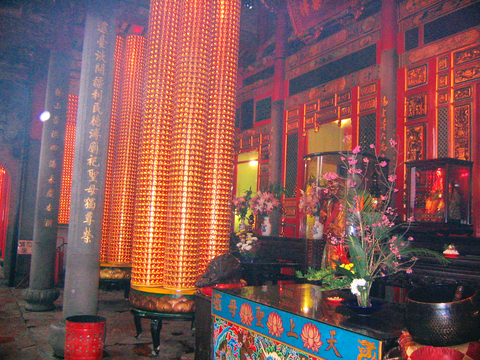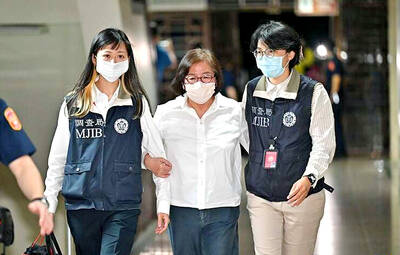One morning last week, Luo Tsai-yan (
She carefully wrote down on a piece of paper five family members' names, birthdays, addresses and wishes.
Then she waited in line at the registration counter to hand the information to temple staff, so they could later stick the information on each of the five luminaries they helped light.

PHOTO: MO YAN-CHIH, TAIPEI TIMES
Lighting the luminary -- known in Mandarin as the the guangmingdeng (
The illumination ceremonies draw crowds each year to local temples as the Lunar New Year approaches.
This year at Longshan Temple, however, the rush started since the beginning of the month, when the temple began to accept guangmingdeng registration. Long lines formed outside the temple almost every day at 6am.
That brisk business -- which kept temple workers busy processing over 1,000 luminary registrations per day -- may be a result of the public's general sense of uncertainty, according to Chang Chun-hung (
"The sluggish economy and awful political situation brought people here to find peace of mind," Chang told the Taipei Times. "Those who are too busy to take care of their kids or their elders also come to seek help from the gods."
While the guangmingdeng ensure general good fortune, they are traditionally divided into three categories. The "studies light" blesses students with wisdom and good grades, the "career light" protects people's work, and the "wealth light" bestows riches in the new year.
Another popular yearly ritual is the An Tai Sui (安太歲) service. Those whose zodiac signs are in conflict with Tai Sui -- the deity who rules over all the deities -- perform this ritual to appease the deity and pray for his protection.
Three years ago, the temple started to offer the lighting of the "Medicine Light," which ensures good health and longevity, at the request of the public, which now includes many elderly. Starting on Lunar New Year's Day, the temple is going to answer another new demand.
"We will start to offer the `marriage light' because many parents want the blessing of the god of marriage for their daughters, who are still single in their 30s or even 40s," Chang said.
Inside each worship hall, lamp pillars embedded with tiny lightbulbs stand tall next to different gods. Lamp screens covered by a pink sheet of paper with personal information on them mean that they are already taken.
"The guangmingdeng rep-resents blessing and enlightenment from God. It gives you wisdom and inspiration, and provides a spiritual and peaceful power to light up your path," Chang said.
The many people who seek enlightenment at the temple include foreigners from the US, Japan and Australia.
"Most of the foreigners come to seek good fortune in their careers, and we get people to translate the information into Chinese, in case our gods don't understand what it means," Chang said.
Sitting at a corner of the long table, a middle-aged woman surnamed Kim (
A woman surnamed Luo, on the other hand, said the custom is a ritual she keeps regardless of the economic or political situation.
"This is a Chinese tradition that I do every year for my family, whether the economic or political situation is good or bad," she said.
Chang said the guangmingdeng and An Tai Sui are actually products of modern society. An Tai Sui, for example, was traditionally performed at people's homes, and people would worship the image of Tai Sui on the first and fifteenth day of the lunar month.
The busier lifestyle in modern society, however, has made people entrust the job to the temple. These services have generated substantial funds for the temple since January, since lighting a luminary costs from NT$600 to more than NT$2,000 for a large light.
Besides the Longshan Temple, another famous temple, Paoan Temple, also offers guangmingdeng and An Tai Sui services. Hsingtien Temple does not offer such services.
"We followed the traditional ways and encourage people to get an idol of Tai Sui and worship it at home. This is a more effective way to get your prayers answered," said Lee Chu-hua (
The traditional practices of local temples, however, have also gone through changes. Many temples stopped burning ghost money five years ago, and began to accept online registration for guangmingdeng or An Tai Sui services.
The next step, Chang said, could be to eliminate the burning of incense out of environmental concerns.
But some of the Lunar New Year traditions -- such as the famous incense-snatching ceremony at Hsingtien Temple on New Year's Day -- will continue to attract crowds to local temples to seek good fortune for the coming year.

Costa Rica sent a group of intelligence officials to Taiwan for a short-term training program, the first time the Central American country has done so since the countries ended official diplomatic relations in 2007, a Costa Rican media outlet reported last week. Five officials from the Costa Rican Directorate of Intelligence and Security last month spent 23 days in Taipei undergoing a series of training sessions focused on national security, La Nacion reported on Friday, quoting unnamed sources. The Costa Rican government has not confirmed the report. The Chinese embassy in Costa Rica protested the news, saying in a statement issued the same

Taiwan is to extend its visa-waiver program for Philippine passport holders for another year, starting on Aug. 1, Minister of Foreign Affairs Lin Chia-lung (林佳龍) said on Friday. Lin made the announcement during a reception in Taipei marking the 127th anniversary of Philippine independence and the 50th anniversary of the establishment of the Manila Economic and Cultural Office (MECO) in Taiwan, the Ministry of Foreign Affairs said. The decision reflected Taiwan’s commitment to deepening exchanges with the Philippines, the statement cited Lin as saying, adding that it was a key partner under the New Southbound Policy launched in 2016. Lin also expressed hope

Temperatures in New Taipei City’s Sindian District (新店) climbed past 37°C yesterday, as the Central Weather Administration (CWA) issued heat alerts for 16 municipalities, warning the public of intense heat expected across Taiwan. The hottest location in Taiwan was in Sindian, where the mercury reached 37.5°C at about 2pm, according to CWA data. Taipei’s Shilin District (士林) recorded a temperature of 37.4°C at noon, Taitung County’s Jinfeng Township (金峰) at 12:50 pm logged a temperature of 37.4°C and Miaoli County’s Toufen Township (頭份) reached 36.7°C at 11:40am, the CWA said. The weather agency yesterday issued a yellow level information notice for Taipei, New

CASE: Prosecutors have requested heavy sentences, citing a lack of remorse and the defendants’ role in ‘undermining the country’s democratic foundations’ Five people affiliated with the Chinese Nationalist Party (KMT), including senior staff from the party’s Taipei branch, were indicted yesterday for allegedly forging thousands of signatures to recall two Democratic Progressive Party (DPP) lawmakers. Those indicted include KMT Taipei chapter director Huang Lu Chin-ru (黃呂錦茹), secretary-general Chu Wen-ching (初文卿) and secretary Yao Fu-wen (姚富文), the Taipei District Prosecutors’ Office said in a news release. Prosecutors said the three were responsible for fabricating 5,211 signature forms — 2,537 related to the recall of DPP Legislator Wu Pei-yi (吳沛憶) and 2,674 for DPP Legislator Rosalia Wu (吳思瑤) — with forged entries accounting for